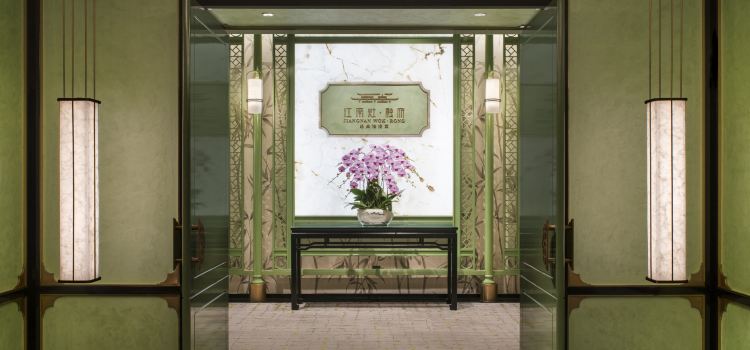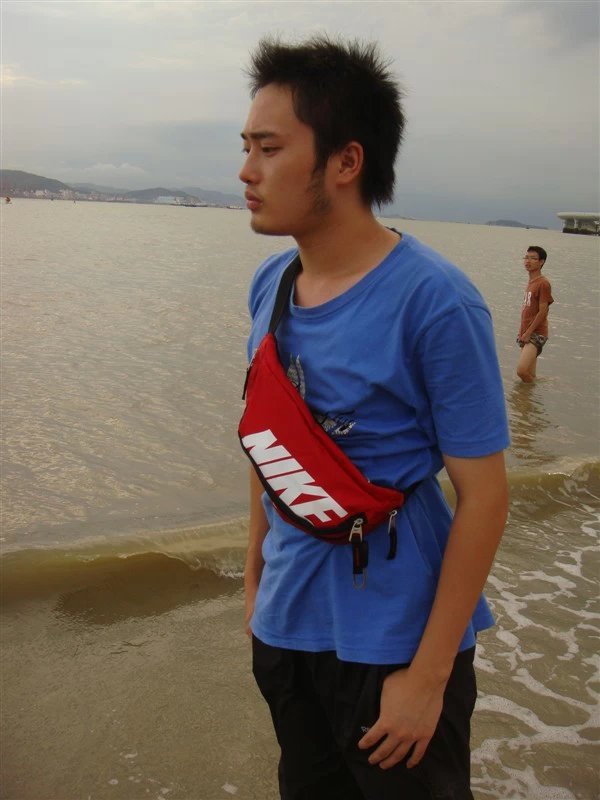JIANGNAN WOK ·RONG
5/528 Reviews
Dongjiekou Shopping CenterAU$108
Reason:Traditional charm creates a refined setting for innovative Huaiyang delicacies.

Currently closed|Open tomorrow at 11:30
+8613774570334
What travelers say:

A must-try in Fuzhou, Michelin-starred restaurant Jiangnan Zao Rongfu
The 2024 Michelin one-star restaurant in Fuzhou is Jiangnan Zao Rongfu, located in Shangri-La Chinese Restaurant in Fuzhou. The restaurant is advised by chef Hou Xinqing, the regional executive chef of Shangri-La Group and the award-winning chef of Jiangnan Zao Restaurant. It cleverly combines classic Huaiyang with Fuzhou's garden private mansion, bringing a gourmet experience of "seeking the scenery in the mansion and enjoying the feast with the heart".
The restaurant continues the brand concept of "Jiangnan Zao", based on the "garden, literature, and banquet" trinity described in "Geyuan Ji" by Liu Fenghao, a poet of the Qing Dynasty, and integrates private mansion gardens, the Maritime Silk Road, and the feelings of overseas Chinese returning home into the restaurant design. The menu of Jiangnan Zao Rongfu was jointly formulated by chef Hou Xinqing, a restaurant consultant, and Ma Xupeng, the executive chef of the restaurant. Classic cuisine Huaiyang Guiliu boiled dried silk, the delicious soup blends into the thin bean skin silk and is full of vitality, and the mouth is still recalling the deliciousness of the ingredients. Hand-peeled river shrimp fried with olive kernels, a seemingly simple dish. The shrimps are crisp and light, and adding a little vinegar adds a lot of taste buds. Huaiyang soft pocket is a dish I like very much. It tastes good, is well processed, has no fishy smell, and is especially fragrant when paired with rice.
More
Reviews of JIANGNAN WOK ·RONG
Some reviews may have been translated by Google Translate
5/5Outstanding
All (28)
Latest
Photo reviews (21)
Positive reviews (4)
A must-try in Fuzhou, Michelin-starred restaurant Jiangnan Zao Rongfu The 2024 Michelin one-star restaurant in Fuzhou is Jiangnan Zao Rongfu, located in Shangri-La Chinese Restaurant in Fuzhou. The restaurant is advised by chef Hou Xinqing, the regional executive chef of Shangri-La Group and the award-winning chef of Jiangnan Zao Restaurant. It cleverly combines classic Huaiyang with Fuzhou's garden private mansion, bringing a gourmet experience of "seeking the scenery in the mansion and enjoying the feast with the heart". The restaurant continues the brand concept of "Jiangnan Zao", based on the "garden, literature, and banquet" trinity described in "Geyuan Ji" by Liu Fenghao, a poet of the Qing Dynasty, and integrates private mansion gardens, the Maritime Silk Road, and the feelings of overseas Chinese returning home into the restaurant design. The menu of Jiangnan Zao Rongfu was jointly formulated by chef Hou Xinqing, a restaurant consultant, and Ma Xupeng, the executive chef of the restaurant. Classic cuisine Huaiyang Guiliu boiled dried silk, the delicious soup blends into the thin bean skin silk and is full of vitality, and the mouth is still recalling the deliciousness of the ingredients. Hand-peeled river shrimp fried with olive kernels, a seemingly simple dish. The shrimps are crisp and light, and adding a little vinegar adds a lot of taste buds. Huaiyang soft pocket is a dish I like very much. It tastes good, is well processed, has no fishy smell, and is especially fragrant when paired with rice.
The dishes are cooked by chef Hou Xinqing in Huaiyang cuisine, integrating local characteristics and seasonal ingredients. Chef Hou Xinqing, known as the Huaiyang Swordsman, has appeared on the "Tip of the Tongue" and "Flavorful World".
Today I checked in at Jiangnan Zao Rongfu in Fuzhou. It was a really great dining experience! As soon as I entered the private room, I was shocked by the luxurious decoration. It is the best choice for business banquets.
Elegant environment, Huaiyang cuisine carefully cooked with seasonal ingredients, beautifully presented
Fujian Province, with its geographical environment of mountains and seas and unique regional culture, has formed its own distinctive characteristics in Chinese history, including language, food, architectural style and folk customs. #江南灶 came to eastern Fujian, combining the elegance of #淮洋菜 with the garden private kitchen of Fuzhou. #江南灶融府, which has only 12 private rooms, came into being, adding a touch of Jiangnan freshness to Fuzhou's high-end dining. At the entrance of the restaurant, an "old fishing boat" moored on the shore is very eye-catching. Everlasting moss, ink inkstone, Minhou bamboo weaving and ever-lasting banyan tree branches symbolize the historical "ship" inheritance of the Maritime Silk Road. On the way to the private room in the restaurant, the fresh Jiangnan charm comes into view. Inspired by the private garden in the Sanfang Qixiang Historical and Cultural District, a banquet space with both artistic sense and luxury is constructed. Jiangnan Stove #Rongfu is advised by Shangri-La Group's regional Chinese restaurant executive chef 👨🍳Hou Xinqing, and managed by the restaurant's executive chef Xu Gongchang 👨🍳. With numerous award-winning chefs to escort, it can be seen that #Shangri-La Hotel is dedicated to the restaurant. Fujianese treat guests with tea. As soon as they enter the private room, the tea master handed over the jasmine tea that Fuzhou people love the most. A mouthful of it instantly isolates you from the summer heat outside. The chopsticks are made of Fuzhou lacquerware craftsmanship, and the shells inlaid on them are particularly gorgeous. Sincerity can be seen from the appetizers. "Wensi Tofu and Bamboo Shoot Jelly" combines the two well-known ingredients of Huaiyang cuisine and Fujian cuisine, which are very representative of their own characteristics. It is not at all inconsistent, and it also sets the tone for Rongfu. The fruit lotus root from Mata Lake in Zibo, also known as white lotus root, has a crispy and tender taste and no residue in the mouth. It can be eaten raw directly. It is paired with passion fruit jam, which is a very refreshing summer dish "Passion Fruit Mata Lake Fruit Lotus Root". "Fresh Olive Conch Winter Melon Soup" is a very typical Yangzhou dish that tests the chef's knife skills. The winter melon blooms like a flower in the soup. "Three Shrimp Crab Roe Tofu" is a classic Jiangnan dish that combines the essence of shrimp and crab. The deliciousness of shrimp and crab is combined with the tenderness of tofu. The taste is rich and layered. It is also a dish that tests the chef's kung fu. "Ginger Mother Eight Treasure Gourd Duck", as the name suggests, is a fusion of Huaiyang cuisine "Eight Treasure Gourd Duck" and Fujian cuisine "Ginger Mother Duck". It is also a classic presentation of "invisible knife skills". The whole duck is boned and stuffed with eight treasures (glutinous rice, lotus seeds, yellow jade ginseng, abalone, pine nuts, fresh bamboo shoots, pork belly, shrimp), and simmered over low heat. Combined with the medicinal cooking method of "ginger duck", it has more nourishing but not greasy, warm but not dry effects. The fried ginger enriches the taste of the eight-treasure duck, adding fragrance and removing fishy smell. How can the classic Huaiyang "skin wrapped in water" be missing? "Huaiyang Xiaolongbao" has a thin and translucent skin, and the soup melts into the mouth. During the meal, the TV in the private room kept repeating the activities of tracing the source of ingredients. After the meal, I finally tasted the organic Tremella from Gutian County. The chef paired it with sea buckthorn jelly. The "sea buckthorn juice organic Tremella juice" was not sweet or greasy, and it had a refreshing ending. Shenzhen to Fuzhou, 4 hours and 30 minutes by train. Because of Jiangnan stove, we will meet again.